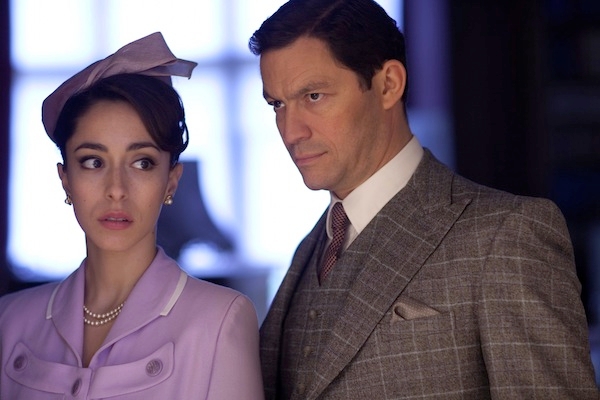Oddly enough, while all the action and activity made The Hour very enjoyable, the scene that captivated me (and secured my attention for the next six weeks) was the one in which nothing occurred and little was said: Lix Storm (Anna Chancellor) and Randall Brown (newly appointed Head of News, played by Peter Capaldi) held a one-minute parley, alone in Lix’s office, and with it they stole the show. Brown, carrying a plate of heavily Marmited toast, stepped into the glass-walled room. Lix gave him a glass-walled look. He examined her through the viewfinder of a camera. She took off her spectacles. ‘I will not apologise,’ she said, apropos of nothing. ‘I offer no regrets.’ Brown turned the camera in his hands and spoke in riddles. ‘Dust on the lens. Didn’t I always tell you what happens if you leave the cap off the lens?’ For a minute the atmosphere crackled with static, and then Mr Brown picked up his toast and slipped away. It was a moment of tension and promise that invigorated the whole hour.

Brown and Lix, eyeing one another like two stray cats on a thundery night, made the concerns — both romantic and professional — of Freddie (Ben Whishaw) and Bel (Romola Garai) seem rather garish. Drama might have advertised this episode, but restraint distinguished it: Marnie Madden (Oona Chaplin) took a stand against her husband (Dominic West) merely by standing up (there’s nothing like the threat of public histrionics to make a husband pay attention to his wife), and in another accomplished scene she needed nothing more than an egg whisk and the blaring television (which was tuned to ITV, naturally) to advance her character beyond her marriage and into the modern era. Mr Madden, we suspect, may soon find himself usurped by Mrs Madden’s trifles.
Everyday (Thursday, Channel 4) was a very different — the very opposite — kind of drama. Karen (Shirley Henderson) lives at home with four young children. Her partner Ian, the children’s father (John Simm), is in prison for an unnamed crime. Everyday was a 90-minute study of a five-year sentence — not his, but theirs: it showed the family adjust, adapt and develop over the period of Ian’s absence. We followed the children to school, we visited them at home, we walked back and forth to the shops and we joined their trips to prison. That was it: for five years, we dipped in and out of their everyday lives.
It was a film about a shared penalty, but emphatically not about criminality, justice or the prison system. Prison was a visiting room, a series of locked doors and a cell — just a place, neither good nor bad. Ian’s crime was never discussed (although theft and drugs were mentioned) and a moral judgment was never offered.
But (with typical commitment) the director, Michael Winterbottom, had pursued authenticity to an extraordinary standard in order to strike the viewer directly in the heart: Everyday had been shot over a five-year period which meant that the children’s development looked and felt realistic because it was. (They were real-life siblings, not actors with scripts, and the house that they occupied was their real home.) Karen and Ian were actually ageing in front of our eyes, the seasons were passing, and Christmases came and went. Life went on.
To watch the real effects of the passing years was on the one hand extraordinary, and on the other perfectly natural. Winterbottom was attempting to disguise drama, and to recreate reality, with such attentiveness that we would forget we were watching a fiction. When we witnessed how much the children altered in five years, the implications of their father’s five-year absence would be more striking. The passage of time would hit home, so to speak, and hit hard.
The director’s skill is undeniable, and the close presence of real life and real events was extremely destabilising: if it was hard to watch the littlest boy break down in tears, it was doubly hard to remember that this was acting and that he was crying on command. It was a masterful piece of film-making, but it is unnerving to be so manipulated. While I admired every minute of Everyday, I longed for the end of five years.





Comments